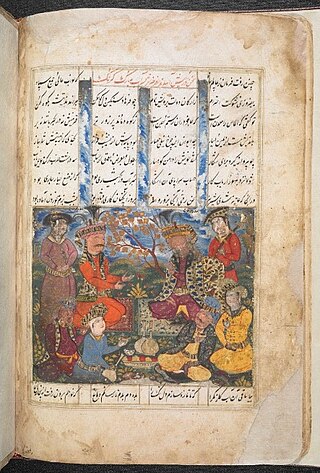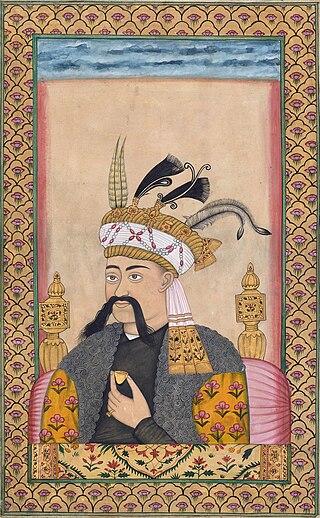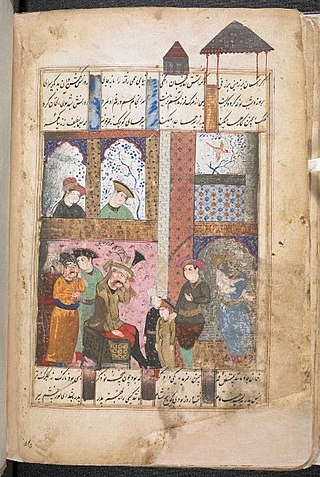Bagrat VII (1569–1619),also known as Bagrat Khan,was king (mepe) of Kartli,eastern Georgia,effectively serving as a khan for the Persian shah Abbas I from 1615/1616 to 1619.

Allahverdi Khan was an Iranian general and statesman of Georgian origin who,initially a gholām,rose to high office in the Safavid state.

Imam-Quli Khan was an Iranian military and political leader of Georgian origin who served as a governor of Fars,Lar and Bahrain for the shahs Abbas I and Safi.

Daud-Khan or Dāvūd b. Allāhverdī was a Safavid Iranian military commander and politician of Georgian origin who served as governor (beglarbeg) of Ganja and Karabakh from 1627 to 1633.

The Undiladze family was a Georgian noble family whose members rose in prominence in the service of Safavid Iran and dominated the Shah’s court at a certain period of the late 16th and early 17th centuries.
Rostam Khan or Rostom-Khan Saakadze was a high-ranking Safavid military commander and official of Georgian origin. He held the position of commander-in-chief (sepahsalar) under the Safavid shahs,Abbas I and Safi. In 1643,he was accused of treason and executed under king Abbas II. He features in the contemporary Persian and Georgian chronicles and is also a subject of the 17th-century Persian biography written by a certain Bijan for Rostam Khan's grandson,his namesake and a high-ranking officer in Iran.

Qarachaqay Khan was a military commander in Safavid Iran of Armenian origin. He was known for his great collection of porcelain items and loyal service to Shah Abbas I. Qarachaqay Khan was killed while commanding an expedition against the Georgian rebels.
Paykar Khān IgīrmīDūrt was a Qizilbash chieftain in the service of Safavid Persia in the late 16th and early 17th centuries. His career flourished in the southeastern Caucasus,where he ran the governments of Barda and Kakheti on behalf of Shah Abbas I until being overthrown in a Georgian uprising in 1625.
Otar Beg,also known as Otar Khan,later known as Zu al-Faqār Khan,was a Safavid military commander,royal gholam,and official from the Georgian Baratashvili-Orbelishvili (Orbeliani) clan.
Bektash Beg Torkman,also commonly referred to as Bektash of Kakheti,was a Safavid military leader,who was the first member of the Qizilbash to govern Kakheti.
Bijan Beg,also known as Bijan Beg Gorji,was a Safavid courtier,official,and royal gholam from the Georgian Saakadze clan. He was one of the most influential and closest servants of king Abbas I in the latter's early reign.
The Mirimanidze family were a Georgian noble family of Armenian ethnicity whose members rose in prominence in the service of Safavid Iran. Hailing from Somkhiti,the clan produced numerous high-ranking figures in the Safavid state,and especially flourished in the 17th century,during the reign of the kings Abbas I,Safi and Abbas II. Due to the complex character of the family's identity,they were often described in different terms by contemporaneous historians. In the late Safavid era,Hosaynqoli Khan,vali (governor) of Kartli,confirmed the family as belonging to the t'avadi.
Bektash Khan,also known as Bektash Khan Gorji,was a Safavid official and gholam who served as the governor (beglarbeg) of Baghdad between 1631 and 1638,during the reign of Shah (King) Safi. His tenure was brought to an end in 1638 when the Ottomans captured the city during the ongoing Ottoman-Safavid War of 1623-39.
Abd-ol-Ghaffar Amilakhori was an early 17th-century noble from the Georgian Amilakhori family of Kartli,prominent in the Safavid Iranian service.

Safiqoli Khan was a Safavid official of Georgian origin,who served as the governor (hakem) of Lar in 1629-1630 and in 1632 during the reign of king Safi.
Siyavosh Beg,also known by his nisba of Bāshīāchūghī,was a Safavid military commander,official,and gholam of Georgian origin.
Amir Beg Armani was a 17th-century Safavid official,courtier,and gholam of Armenian origin. He served during the reign of the kings Safi and Abbas II,and functioned as the royal sommelier (shirehchi-bashi) for several years,as well as governor (hakem) of Gaskar (1633-1643).
Aliqoli Khan was a Safavid official,gholam,and high-ranking military commander of Georgian origin,who served during the reign of three consecutive Safavid kings (shahs);Safi,Abbas II and Suleiman I
Rostam Khan was a Safavid military commander,gholam,and official from the Georgian Saakadze family. He served as commander-in-chief,commander of the musketeer corps (tofangchi-aghasi),chancellor/chief justice (divanbegi),and governor (beglarbeg) of the Azerbaijan Province under king (shah) Suleiman I.
Hirotake Maeda is Professor of History at the Faculty of Humanities and Social Sciences of Tokyo Metropolitan University. He specializes in Middle Eastern Studies,Eurasian Studies,and the histories of Iran and the Caucasus. He focuses in particular on the origins of the gholam military Forces of Safavid Iran and their role and position in Iran's history,using Persian and Georgian sources.




